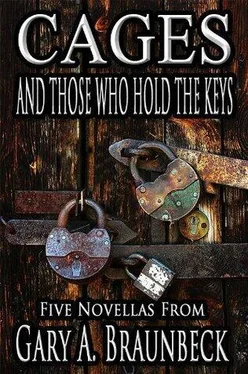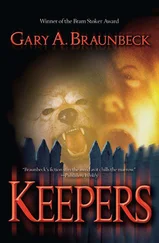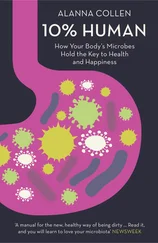Jackson grinned. “Not that kind of bad shape. The guy was shit-scared half out of his mind. Wanted to be put someplace where no one could see him.” “Did he get here before or after Bill Emerson?” “After.” Jackson grinned. “Can’t say any of us were much help to Bill.” “Still no word about Joe, then?” “Afraid not. I’ve got my deputies out looking for him, as well, now. Don’t worry, We’ll find him.” “God, I hope so.”
We arrived at the door to the Reverend’s office-slash-living quarters. Jackson gripped the doorknob, then looked at us. “I was kinda into Parallax, too, when I was younger. That’s why I about fell over when I saw who this was.” He opened the door and we stepped into the room.
Byron Knight—that’s right, the Byron Knight—was laying on a cot beside the Reverend’s desk. It had been almost 30 years since anyone had seen him. Most people who cared to remember him at all assumed that he was dead, what with his dramatic disappearance back in the early 1980s.
The years had not been good to him. His once muscular frame—featured on the covers of both Rolling Stone and Melody Maker the same month—was now an emaciated ruin. The clothes he wore were torn, patched, and tattered. And the sickly-gray pallor of his skin betrayed an illness I was all-too familiar with: cancer. I’d watched it slowly chew my mother to death after Dad abandoned us when I was twelve.
“The source of the ulceration,” whispered the Reverend.
“The source of the what?” asked Jackson.
The Reverend, ignoring the sheriff’s question, turned to me. “You stay here with him, Sam, all right? Don’t let anyone except me or Ted or Grant through the door, understand?”
“Yes sir.”
“What the hell is going on?” asked Jackson. “I only ask because it seems to me that neither one of you were too surprised to see him here. Me, I see a rock star from 30 years ago who I thought was dead, I get curious.” The Reverend took hold of Jackson’s arm and led him out of the room. “Lock the door behind us, Sam.” “Don’t have to tell me twice.” They left, I locked the door, and I heard a voice from behind me say one word. “…mudman….” Wow. Okay, it wasn’t quite the same as hearing Morrison call himself the Lizard King…but it was close.
The Buckeye State has produced only four rock acts that ever amounted to anything more than passing curiosities; Devo (Akron), The James Gang (Cleveland), Guided By Voices (Dayton), and Parallax (Zanesville/Cedar Hill). Parallax came out of central Ohio in the mid-1970s, just as the progressive rock movement was hitting its zenith. Bands like Yes, Emerson, Lake & Palmer, Flash, King Crimson, and a trio of Canadian upstarts calling themselves Rush were engulfing the airwaves with long, complex “concept” pieces like “Close to the Edge”, “Tarkus”, and “2112”. It was not uncommon (thanks to the earlier success of Iron Butterfly’s 17-minute “In a Gadda-Da-Vida”) to turn on your FM radio and hear only three songs played over the course of an hour. 10-minute songs were almost short compared to a half-hour epic like “Karn Evil 9.” It seemed that if you were going to be taken seriously in the prog rock movement (by anyone who wasn’t Lester bangs of Creem magazine), you had to produce a “concept” piece that would initially befuddle listeners while giving the DJs time to take a leisurely piss break. A lot of it was pretentious crap, but some of it was kind of amazing. It didn’t matter if you thought Rush’s “The Fountain of Lamneth” was overblown silliness, because Yes’s “The Revealing Science of God” might blow you away right after.
One of these concept pieces that you could hear played on FM radio back then was an 18-minute beauty by Parallax entitled “Kiss of the Mudman.”
What made “Mudman” so unique that even Lester bangs admitted a grumbling admiration for it (Bangs was infamous for loathing everything about the prog-rock movement) was its fusion of traditional blues with Hindi music. Critics were divided on whether or not it was a successful piece, but even those who disliked it had to admit that it was unlike anything produced during the short-lived prog era—and that it was performed by your basic rock trio, using only a bass, drums, and a single guitar, without any studio trickery or overdubs, served, according to Rolling Stone ’s review, “…as a testament to Parallax’s serious-minded goals, if not their cumulative musicianship, which seems too agile at times to move ‘Mudman’ into the realm of potential classic. Still, Canada’s Rush might soon have reason to be looking over their shoulders if Knight, Shaw, and Jacobs continue to move in this direction.”
Kiss of the Mudman (both the album and the song) made Parallax instant (if fleeting) icons. Their two previous albums (both of which had done okay but not great) were re-issued and sold like crazy, giving them two gold and one platinum album the same year, 1978.
And then Alan Shaw, the bassist, died of a heroin overdose, and Tracy Jacobs, the drummer, was killed in an auto accident (it was later determined that he’d been drunk at the time). Byron Knight recorded a terrific solo album that just bombed, and then he dropped off the radar. Some college stations still dusted off “Mudman” from time to time when the DJs felt like making fun of it (or needed a leisurely piss break), and it, like the band who recorded it, was now nothing more than a curiosity piece.
Still, if you were a fan, (like I’d been) to hear the man who’d written and sang the song mumble the word “…mudman…” was, well…still kind of a thrill, and I couldn’t help but remember the verse that had been all the rage for a few months back when I was a teenager:
“ You wonder where it all went wrong and why you feel so dead
why it seems that every day you’re hanging by a thread
Are you still who you were and not what you’ve become?
Is this the taste of failure that lingers on your tongue?
Your dreams are ending in a place
far from where they began
Because what’s on your lips
Is the memory of the kiss
Of the mudman…”
Okay, “Blowin’ in the Wind” it wasn’t, but as a soul-sick cry of loneliness and alienation, it works—and that’s what “Mudman” was, an 18-minute musical suicide note, chronicling the last minutes of a dying rock star’s life as he looks back on all the people he’s hurt and left behind, knowing that none of it—the fame, the money, the women and riches—was worth it, that all he’d ever wanted he’d pissed away, and now had to die alone, and deserved his fate.
I’d always wondered just who or what the Mudman was (as did all the fans of the piece), but Knight would never say.
“…sonofabitch,” he slurred from the cot as he attempted to sit up. I went over and helped him, got him a glass of water, and watched as he pulled a bottle of pills from his pocket and popped two of them into his mouth. “For the pain,” he said, taking a deep drink of the water. Setting down the glass, he wiped his mouth, rubbed his eyes, and looked at me. “Was I dreaming, or did you say something about an ulceration?” I shook my head. “That was someone else, the Reverend, the man who runs this shelter.” “Ah.” He blinked, coughed a few times, and rubbed the back of his neck. “I’m kinda sick, I’m afraid.” “Cancer.” It was not a question. He looked at me. “Seen it before, have you?” “Yes.” “Don’t worry, I’m not gonna flip out on you. I just needed to get a little shut-eye in a warm place.” “You’re Byron Knight.”
He paled at the mention of his name. “I was Byron Knight. Now I’m just a sick transient who’s come back to his hometown to die. Think the Reverend would have any objection to my doing it here?”
Читать дальше












